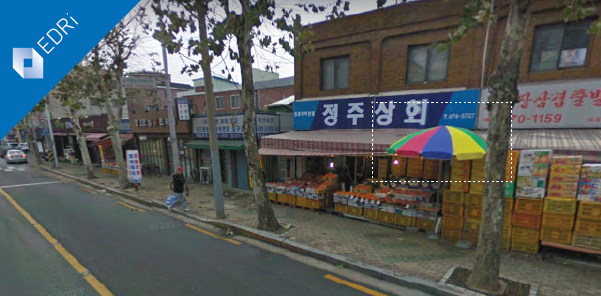Whom do we trust with the collective good?
Wittingly and unwittingly, we increasingly leave the care of society to tech companies. This trend will prove detrimental to us.
In search of gentrification
Gentrification is a process in which a neighbourhood attracts more and more well-to-do residents, gradually driving out the less affluent. The Dutch designer Sjoerd ter Borg, collaborating with Radboud University Nijmegen among others, is researching whether we can use technology to recognise this urban process from large quantities of visual information.
One of the first projects originating from this research makes use of Google Street View archives. While looking for indications of gentrification in Seoul, South Korea, Ter Borg came across the beach umbrella. Street vendors use these umbrellas to stand out while staying in the shade. Beach umbrellas have long dominated the streets of Seoul, but they are disappearing from gentrified neighbourhoods. Because Google photographs streets at regular intervals and Street View has the option to go “back in time”, it makes for a perfect visualisation of this phenomenon. This enabled Ter Borg to create the intriguing film Beach Umbrella that touches on urgent questions concerning the access to and use of data.
Data on the present means control over the future
Whether you want to virtually walk the streets of Seoul or check out the gardens of a Yorkshire village: for the best results, you’ll have to go to a US company. Of course there are other initiatives, such as the data portal Amsterdam City Data made by the City of Amsterdam, that collect and connect data and make it available. The scale on which this is done, however, is incomparable. The Google Street View archives are unequalled. Moreover, Google enhances the data collected by its Street View cars with for instance satellite images. Local authorities provide the company with information on the design of public space; public transport companiesprovide timetables and real-time information on disruptions. The mobile phones we all carry with us are useful sensors for Google.
And the result? If Google were to go into real-estate development, it would have a head start. If it were to make a bid for Amsterdam’s public-transport service, without a doubt the company could do it more efficiently than the city’s own transport company. Thanks to Google’s access to immense quantities of data combined with the unlimited capacity for making complex analyses, it can make better-founded assumptions regarding future developments. And that’s the most painful bit: as a logical consequence of our blind faith in big data, the future will be shaped by the parties with the most data and the greatest computing power at their disposal.
Increasingly, public data is in private hands
More and more those powerful parties are private companies. It’s a disturbing thought that Google has more data on Amsterdam’s urban development than the city itself. Not only do other companies find it increasingly difficult to compete with Google, but the public sector is being left behind as well. We are moving toward a situation in which more and more of our public data is privately owned—and leased back to us under commercial terms.
An untenable situation, once you realise that Google will be the one to decide which data should be collected and which part of it should be disclosed to whom and under what conditions. Should Google be unhappy with the direction a certain research project is taking, or with the products and services being constructed on the basis of “its” data, it can simply shut down access to those data. If it turns out that Google’s interests conflict with citizens’ interests, we have no democratic means to hold it accountable or influence plans as we would with local government. If we are not careful, collective means to cultivate the collective good will become increasingly scarce.
The future is nearer than you think
Do you think these are problems of the distant future? Think again. In Canada right now there is a vehement discussion about the development of Toronto, where Google’s sister company Sidewalk Labs is developing a “smart neighbourhood”.
Everything that’s been going wrong for years wherever Google steps in, is also going wrong in Toronto. One after another, privacy experts are leaving the project disillusioned; inhabitants don’t get a say in what is happening, nor will they be able to opt out once it’s done; all the data generated for the project seems to become the property of Sidewalk Labs, enhancing the Google family’s hegemony even further.
The promise of data blinds us to its shortcomings
A little digression. During his stay in Seoul, Ter Borg picked the beach umbrella as the symbol of a non-gentrified street view. An easily recognisable object that appeals to the imagination of people outside the South-Korean capital as well. However, it of course strongly simplifies a complex and layered process. Collected data and the data deduced from that may approach reality, but is not reality. In the context of Ter Borg’s project that’s not a problem; in the context of decisions on urban problems and developments, it is. Do we really trust the Googles of the world to build our future on the basis of an illusion?
What are the consequences for our society?
Having more data, or “as much data as Google”, is not the solution. What is needed is a greater vision on data collection and use—for what purpose, under which conditions, by whom, what data—and on the special nature of public data. If we believe that there are public matters where the interests of society outweighs commercial interests, then we must also protect that data related to those public matters.

Whom do we trust with the collective good? (only in Dutch, 15.11.2018)
https://www.bitsoffreedom.nl/2018/11/15/wie-vertrouwen-we-het-collectieve-goed-toe/
Google’s “Smart City of Surveillance” Faces New Resistance in Toronto (13.11.2018)
https://theintercept.com/2018/11/13/google-quayside-toronto-smart-city/
City of Amsterdam dataportal (only in Dutch)
https://data.amsterdam.nl
Bits of Freedom
https://www.bitsoffreedom.nl/
(Contribution by Evelyn Austin, EDRi member Bits of Freedom)


